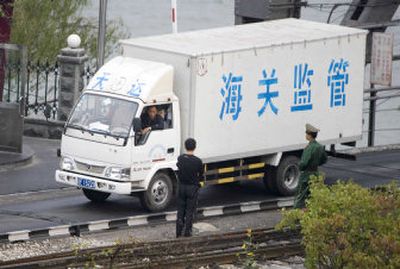China ups inspections on North Korea border

DANDONG, China – Customs officials examined trucks at the North Korean border Monday as China complied with new U.N. sanctions on Pyongyang for its nuclear test. But China’s U.N. ambassador indicated its inspectors will not board ships to search for suspicious equipment or material.
The United States began a new round of diplomacy in Asia to address divisions over how to impose the sanctions, with Secretary of State Condoleezza Rice to arrive in Japan on Wednesday before traveling to South Korea and China. The U.S. announced that air samples gathered last week contain radioactive materials confirming that North Korea conducted an underground nuclear explosion, as it claimed.
China’s support is key to whether the measures will have any impact on neighboring North Korea. Beijing’s mixed response on implementing the sanctions, approved Saturday by a unanimous U.N. Security Council including China, demonstrates the difficulties U.S. diplomats will encounter as they tour the region.
China and Russia contend that interdicting ships might needlessly provoke the North and at the very least discourage it from returning to talks on its nuclear program – though the U.S. and Britain say most inspections of ships would be done at ports rather than on the high seas. Australia announced it was banning the North’s ships from entering its ports, except in dire emergencies.
While China is angry over its communist ally’s behavior and is loath to appear out of step with other powers, it has been reluctant to support or implement tough measures. The leadership is concerned that tightening the squeeze on Pyongyang might trigger a collapse of the North Korean regime, sending refugees streaming across the border.
In a sign of Beijing’s wariness about refugees, construction of a massive concrete and barbed wire fence along parts of its 880-mile border with the North has picked up in recent days. Scores of soldiers have arrived in communities along the banks of the Yalu River, up from Dandong, over the past week to erect the barrier, farmers and visitors to the area said.
The sanctions ban trade with the North in major weapons and materials that could be used in its ballistic missile and weapons of mass destruction programs. They call for all countries to inspect cargo to and from North Korea to enforce the prohibition, “as necessary,” and consistent with each nation’s laws.
In some areas of the border, the Chinese seem to have stepped up inspections, though elsewhere a police officer said nothing had changed and inspections were continuing as usual.
At a border-crossing post in the Chinese city of Dandong, about 30 Chinese trucks were seen being checked on Monday morning while 50 empty North Korean trucks waited in line to enter China to pick up cargo.
Customs officers opened the back of each truck and looked at its cargo as it rolled up, though they didn’t open individual boxes or bags.
By contrast, reporters who visited the border post last week didn’t see inspectors open any trucks.
In the afternoon, the officers repeated the process as loaded North Korean trucks returned home. They climbed into the back of the vehicles, but observers couldn’t see whether they opened any containers.
China’s U.N. ambassador, Wang Guangya, said his country would implement the Security Council resolution and inspect cargo from North Korea for illegal weapons and missiles, but he indicated Chinese inspectors would not board ships. He noted that inspections are not mandatory under the resolution.